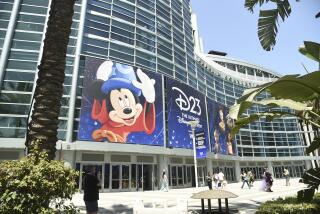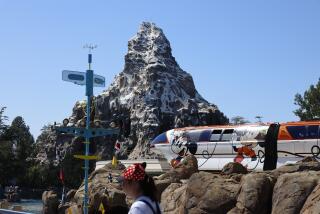A new theme at Tokyo Disney: hardship
- Share via
Reporting from Tokyo — Hiroshi Miura and a dozen other taxi drivers dressed in crisp blue shirts were shooting the breeze in front of the quiet Tokyo Bay Hotel at dusk Saturday. They had one thing on their minds: “X Day.”
“That’s the day Disney is going to reopen,” said Miura, leaning against a buddy’s black cab and lamenting how he has lost at least two-thirds of his fares since Tokyo Disneyland and Tokyo Disney Sea shut down after Japan’s March 11 earthquake and tsunami. “They’re going to post a notice five days before ‘X Day’ on their website announcing what day they are starting operations. We’re all waiting.”
It’s not just taxi drivers who have been suffering without the 70,000 customers that the Disney resorts in Japan attract each day on average. Many nearby hotels, restaurants and shopping centers sustained only minor damage in the quake but have seen a major drop-off in business, vividly illustrating the economic ripple effects of the disaster. The two Tokyo Disney properties are among the most popular theme parks in the world, attracting more than 25.3 million visitors in the 12 months that ended March 31.
The quake crumbled some Disney parking lots, but otherwise the facilities escaped largely unscathed. Yet the resorts’ operator is still facing multiple issues as it considers when to throw open the gates again, including ongoing power shortages linked to the Fukushima nuclear power plant accident and an expected decline in visitors from the disaster zone and overseas.
Attendance may also be curtailed by the phenomenon of “jishuku,” or self-restraint, as some Japanese feel it’s unseemly to overtly partake in leisure activities at this time of national crisis.
A gloomy outlook for Japan’s overall economy after the quake, tsunami and nuclear accident may also make potential Disney visitors think twice about shelling out for tickets.
Oriental Land Co., which owns and operates the parks under license from Walt Disney Co., did not respond to a request for comment. Disney representatives declined to comment. But an analyst at Morgan Stanley in Tokyo who follows Oriental Land said in a recent report that the parks will probably reopen this month during the daytime only and will probably have to discount admission prices because of the shorter hours. Ticket prices were supposed to rise to 6,200 yen ($74) for an adult starting April 23.
Each day the parks are closed costs Oriental Land 500 million yen (about $5.9 million) in operating profit, Morgan Stanley’s Naoshi Nema estimated, and the stock has lost about a quarter of its value since March 11.
The closure’s precise effect on the bottom line of Disney is a bit murky because neither the Burbank entertainment giant nor Oriental Land would comment on details of the licensing agreement. However, analysts at the stock analysis website Trefis estimate that Oriental Land remits about 7.5% of its theme park revenue to Disney, or about $230 million based on figures from fiscal 2009. Walt Disney Co. saw overall theme park operating income fall to about $1.32 billion last year from $1.89 billion in 2008.
Before the earthquake, the Tokyo Disney properties had been rebounding from a downturn in attendance in 2009, according to data from the Themed Entertainment Assn. Nema expects attendance in the 12 months that started April 1 to fall 10% from the 25.3 million visitors in the previous fiscal year.
The effect on Disney’s bottom-line probably would be negligible, said Matthew Harrigan, a media analyst with Wunderlich Securities.
“It’s basically a royalty deal,” Harrigan said. “It’s barely noticeable in the earnings.”
Of greater potential financial significance to Disney is the long-awaited Shanghai park, which is expected to break ground Friday. It would be Disney’s first park in mainland China.
The Mainichi newspaper reported last week that Tokyo Disney officials were considering placing large gas-powered generators within the parks in preparation for prolonged blackouts; the resorts use 570,000 kilowatt-hours of electricity daily, the Daily Yomiuri newspaper said. That’s enough energy to power nearly 1,000 California homes for a month, according to data from the U.S. Energy Information Administration.
In a report Monday, Deutsche Bank analysts Yu Sato and Satoru Kikuchi said “an electricity shortage is the biggest problem” for the parks and that installing generators is “not a realistic near-term solution.”
Even if the parks shorten operating hours or open fewer days, it would be good news for Hideo Serizawa, assistant general manager of the 428-room Tokyo Bay Maihama Hotel, which sits on the perimeter of the park.
The hotel has an average occupancy rate of 85%, Serizawa said, and late March is a particularly busy time because schools are on spring break; rooms start at about $300 (25,000 yen) a night. After the quake, though, the hotel received a slew of cancellations and had to contend with power blackouts, making it impossible to accept bookings even if there were customers.
“There was no problem here in our facilities,” Serizawa said. “But we couldn’t have customers round-the-clock.”
After consulting with officials in nearby Urayasu city, where municipal water supplies were out of commission, the hotel started offering local residents in desperate need of a bath access to its spa for $6 (500 yen); 800 people came on the first day. For those who wanted to bathe in more privacy, the hotel also rented rooms in three-hour blocks for $46 (4,600 yen) and came up with a special $8 (700 yen) menu.
At the nearby Hilton Tokyo Bay, 100 of the 809 rooms are now occupied, mostly by earthquake or tsunami victims who are paying one-fifth the normal rate, spokesperson Mari Ikeda said. Part of the staff is on duty, but most of the housekeepers have been sent home because there’s little work to do.
At the 140-store Ikspiari mall near the entrance to the Disney parks, business resumed with shorter hours March 28 after a hiatus of more than two weeks. Although the shopping center was moderately busy over the weekend, spokeswoman Hiroko Kanno said normally a third of the customers are Disney visitors. If the park remains closed or shortens its hours, that could lead to drops in profits for merchants or layoffs for some of the 3,000 people who work at the mall.
“So far, the store operators have not asked for a reduction in rent,” she said.
Among the shoppers Saturday were Naoko Hikita and Mayumi Imada, friends in their 30s who live on opposite sides of Tokyo and decided Ikspiari would be a convenient rendezvous point.
“Some people say we shouldn’t shop because it’s not appropriate at this time,” said Hikita, who purchased some accessories. “But I think it’s good. It will help the local economy.”
The good news for the parks’ operator and the nearby businesses is that Disney has legions of die-hard fans in Japan like Kyoko and Sachiko Tabata. The sisters live in western Tokyo and came to the park over the weekend just to ride the train that runs along the perimeter and see if there were any signs of life inside.
“I was supposed to come on March 12, the day after the earthquake,” Kyoko said. “I heard they were already practicing for the special Easter event, so we thought maybe we could catch a glimpse.”
Special correspondent Kenji Hall in Tokyo and Times staff writer Dawn C. Chmielewski in Los Angeles contributed to this report.
More to Read
Inside the business of entertainment
The Wide Shot brings you news, analysis and insights on everything from streaming wars to production — and what it all means for the future.
You may occasionally receive promotional content from the Los Angeles Times.











